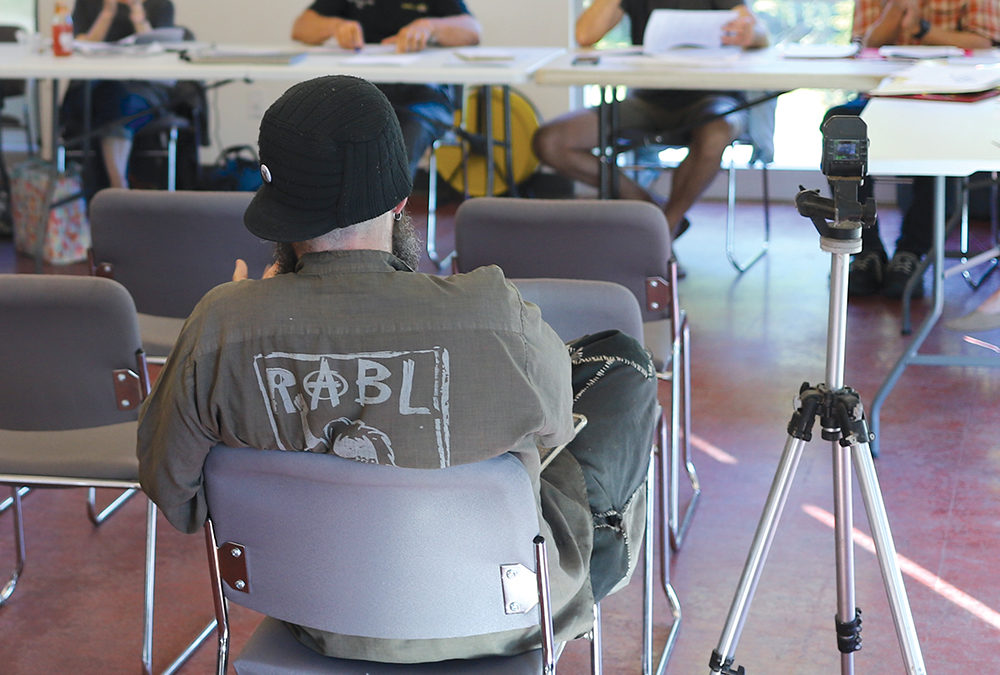Derek Kilbourn
Sounder News
The Board of Trustees for the Gabriola Fire Protection Improvement District (Fire Board) held their regular meeting last week on September 4.
Before the meeting began, a member of the public – identified as Wayne Mercier – set up a tripod and small video recorder.
He was asked by Board Chair Paul Giffin to not record the meeting. Mercier asked under what authority the Board was prohibiting him from recording the meeting as a member of the public. The discussion took place before the meeting of the Fire Board had begun.
Giffin and Mercier had a back and forth with the Chair repeatedly asking Mercier to not record the meeting, and Mercier repeatedly asking the Giffin under what authority that request was being made. Giffin stated the meeting would not start until the camera was removed. Mercier said, “I assert my right to record this meeting. There is no authority to prevent the recording of this meeting. It is my right to do so. This is a public meeting. You are in public.”
As Mercier and Giffin continued to trade requests to turn off the camera – and denials to do so – the volume of the discussion increased.
At some point during the discussion, RCMP were contacted and an RCMP member attended the Fire Hall. Giffin confirmed this past week that RCMP were called due to the behaviour of one of the persons present in the audience.
Mercier was asked what he intended to do with the recording. He said he intended to put the recording up on YouTube – and has since done so, viewable at this link.
“My intention is the public be able to see the meeting.”
Another member of the public – Burtt Fidler – asked the Board why they were objecting to the recording of the meeting. Giffin explained the Board had received a request – that morning – to have the meeting put online.
“That has not been addressed by the Board.”
Giffin explained the Board had to decide what software would be used, and what legal parameters had to be met, in order to have the meeting available to watch online.
“The public has not been told we are doing this [recording] at this meeting.”
Mercier said, “but you’re not being asked to do anything. I will record it and upload it to the internet….I’m coming to assert my rights as a landowner.”
Fidler, speaking from the audience, pointed out every other local government body, their public meetings, are recorded.
The Islands Trust, Regional District of Nanaimo, and Nanaimo-Ladysmith Public Schools all have a way for ratepayers to be able to watch their regular meetings online, either a live feed, or a recording posted after the meeting. Giffin said the Board was not saying they were not going to do so.
Giffin stated to Mercier that he was being disruptive, rude, and loud.
Mercier, in a quieter tone, again asked the Chair what authority was being used to forbid him from recording the meeting. The Chair suggested that the start of the meeting be delayed until the situation was resolved.
The Chair and members of the Board moved into the kitchen area of the Fire Hall, along with Fire Chief Will Sprogis.
There are some local governments within the area which have policies for their meetings around members of the public making audio or video recordings of the meetings.
According to the BC Ministry of Municipal Affairs, under the Local Government Act section 686, Improvement District boards must adopt a bylaw to establish the procedures for conducting business. It is up to the Improvement District to set other policies for managing its meeting, including rules around the use of audio-video recordings of meetings or photography.
Staff with the Regional District of Nanaimo (RDN) said the RDN does not have a policy approving or prohibiting the use of recording devices during RDN Board meetings.
The Islands Trust policy is such that if a person(s) wishes to make an audio or video recording of the meeting, they are to declare this to the chair of the meeting.
The Trust asks that if members of the audience or a presenter asks to not be recorded, that the person doing the recording temporarily suspend recording while those persons speak.
In 2020, the District of Lantzville had passed a motion prohibiting the use of audio or video recording during Council meetings without pre-approval from the Council.
Mercier, speaking to the Sounder after the meeting, said both the Islands Trust and Lantzville policies, “are grounded in the fact that the public body in each case makes their own impartial recording of the meeting which is publicly available.
“The GFPID makes no such effort.
“Nor have they actually passed a bylaw or policy of any kind about it.
“I would LOVE if they made recordings of the meetings available themselves and would support a bylaw that limited or forbade public recording in such a case.
“It is always easier for those in power if civilians quietly capitulate and do not insist on their rights.”





Recent Comments